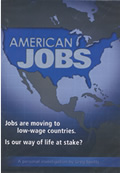Other
Morrison
Articles:
Taking Your Land For Private Developers
IT'S A LONG ROW TO HOE
Joyce
Morrison
October 16, 2004
NewsWithViews.com
Grain producers who grow corn and soybeans in the breadbasket of America are in for a financial cleansing this fall. Not only have some areas suffered the worst drought in twenty years but prices have hit rock bottom.
Harvest has started and grain elevators fearing the Gulf export trade could be severely hampered, along with huge increases in barge fees, have dropped prices and may drop them even further.
Many barges were lost, according to one fertilizer representative, who said his company had 400 barges unaccounted for in the Gulf disruption. This is another indication there will be a shortage in the number of barges available to even contain the grain.
American Farm Bureau Federation�s senior economist, Terry Franci said, �Just over 60 percent corn and soybean exports originate from the New Orleans area. There is mounting concern that the shutdown will compel international buyers to look to other sources.�
Illinois River barge rate index-quotes, used for tracking barge rates movements, increased 52 percent on August 31, 2000, according to the USDA. Corn and soybeans account for nearly half of all commerce barged down the Mississippi River.
How will farmers survive? Will we depend on Third World nations for our food when our farmers go broke?
If you cringe when you fill up your car at the pump, imagine the cost of filling a combine, tractor, trucks and other implements requiring fuel. And even the availability of fuel is threatened as we depend on other nations to supplement our supply.
Farmers and producers are at the bottom of the food chain and should not be confused with Agribusiness industries such as ADM, Cargill and other large corporate processors.
The USDA Loan Deficiency Payment (LDP) provided in the 2000 Farm Bill falls short of the break-even point per bushel of grain and not all crops are covered in the Farm Bill.
Farm groups are beginning to bring to light the dollars given to other programs, but appear to go to the �farmer.� Conservation programs (environmental) received an extreme amount of funding from the 2002 Farm Bill. Food stamps, school lunches and many other programs are funded by the Farm Bill, but the public is not aware and points fingers at the farmer, accusing him of receiving subsidies far greater than he actually gets.
Before you complain about farm subsidies, keep in mind the farmer hates them.
In order to comply with United States Department of Agriculture's Farm Service Agency requirements, the paperwork and control is beyond comprehension.
Nothing would delight the agriculture producer more than to get a fair price for his product, but it has long been believed the government keeps prices suppressed for the benefit of the consumer.
The subsidy is to benefit those purchasing food items and not necessarily the farmer.
CropLife Ambassador Network has some interesting figures on a basic bag of groceries:
1
gallon of milk
12 eggs
5 lb. sugar
1 lb. cheese
1 lb. sirloin steak
2 lb. bag apples
The cost of this bag of safe, nutritional groceries in the U.S. is $18.79 compared to other countries in the world?
England...$23.19
Spain... $28.14
France... $30.10
Japan... $74.23
Although there is a lot of talk about corn and soybeans supplementing oil for fuel in the way of ethanol and biodiesel, it can�t happen overnight. There are not enough renewable energy plants up and running to buy massive amounts of grain for fuel conversion. E-85 can only be used in certain vehicles.
The World Trade Organization (WTO) is demanding cuts to subsidies, and if this happens, you will pay a lot more at the store -- or the American farmer will be broke. That is one way to force the consumer to buy food from Third World countries, where we have no control over the chemicals used or the growing conditions.
The House and Senate Agriculture Committees were expected to try to cut $3 billion in Agriculture Department programs from the federal budget, according to an article in the New York Times.
In the wake of Katrina, farmers have had to dump the milk as the processing companies had to close, but cows still have to be milked twice a day. Sugar cane was blown down, rice and cotton crops ruined. Chicken farms were hit. Any vegetables that were growing are gone.
Problems may not end with a short harvest and blocked river traffic. Drought conditions in the Midwest have caused the Mississippi River to reach dangerously low transportation levels. Below St. Louis, Missouri, 50 to 60% of the flow comes from the confluence of the Missouri River.
The demands of environmentalists add to the stress. The Missouri River�s flow is scheduled to be cut in October, causing even greater loss to the river�s level -- in order to comply with the environmentalists' demands on behalf of two birds and one fish they consider endangered. Will there be enough water to get the loaded barges to New Orleans even if the port is opened and operating at normal capacity?
Although some states have been declared �disaster areas� due to the drought, this only means that a farmer can obtain a low interest government loan IF he can prove he cannot find another source to get a loan. If a farmer is forced to take a government loan, he is on very shaky financial ground and it is his last hope to survive.
Farmers grow weary of hearing �if you can�t make it, get out.� Where will people with this attitude get their food and how much will they pay for it? These are the same people who no doubt think �what they eat comes from the grocery store.�
The New York Times reported Agriculture Secretary Mike Johanns �crisscrossing the nation talking to farmers. His message is the need to reduce farm subsidies both to open more export markets to American farmers and to comply with international free trade agreements.�
�Get used to less, get used to less,� is the message Keith Bolin, a corn and hog farmer and president of the American Corn Growers Association, got from Johanns' talk to the farmers across the nation.
What happened to the promises in the sales pitch for NAFTA, GATT, CAFTA? Weren�t all these trade programs supposed to be the best thing for the farmer, right there next to Mom�s apple pie?
Until river traffic is once again normal, transportation costs will cause an increase in the price of everything from the steel used to build your car to your corn flakes. Coal to run the power plants will have to find a new mode of transportation. Natural gas prices will add more costs to heating our homes.
|
Subscribe to the NewsWithViews Daily News Alerts! |
We may feel the effects of Katrina for years to come. We are dependent on Third World countries for our oil. Do we want to depend on them for our food too?
The
Rural Restoration bumper sticker very appropriately reads, �No Farmers
No Food.�
� 2004 Joyce Morrison
- All Rights Reserved
Joyce Morrison is a weekly columnist and news reporter for the Illinoisleader.com, an online conservative news source. She also writes for SOWER magazine, NewsWithViews.com, as well as various other publications. She is a weekly participant on the teleconference of the Illinois Policy Institute, a conservative think tank and is a pro-life, pro-family activist.
Morrison attempts to educate the public regarding the dangers coming to their local communities through Sustainable Development and Agenda 21 programs which are designed to gradually take control of all private property through undue regulations.
She is a chapter leader for Concerned Women for America as well as Secretary to the Board of Directors of Rural Restoration/ADOPT Mission, a national farm ministry located in Sikeston, MO. FarmersRuralRestoration.com. Her most enjoyable time is spent teaching a senior adult Sunday School class which is a focus on hope and encouragement.
E-Mail: dayspring365@yahoo.com
Many barges were lost, according to one fertilizer representative, who said his company had 400 barges unaccounted for in the Gulf disruption.











